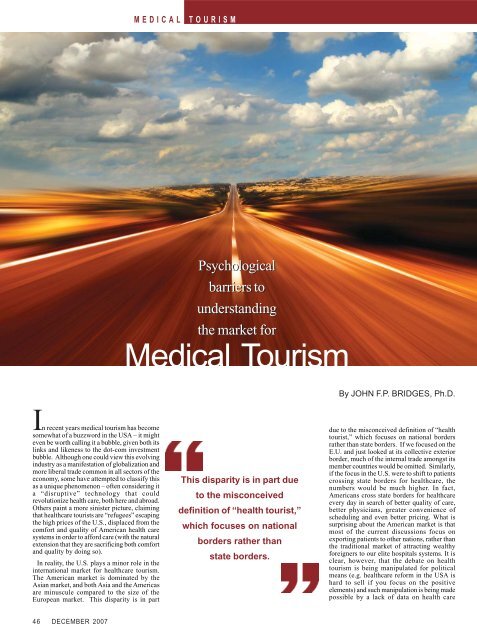Download PDF - Medical Tourism Magazine
Download PDF - Medical Tourism Magazine
Download PDF - Medical Tourism Magazine
You also want an ePaper? Increase the reach of your titles
YUMPU automatically turns print PDFs into web optimized ePapers that Google loves.
In recent years medical tourism has become<br />
somewhat of a buzzword in the USA – it might<br />
even be worth calling it a bubble, given both its<br />
links and likeness to the dot-com investment<br />
bubble. Although one could view this evolving<br />
industry as a manifestation of globalization and<br />
more liberal trade common in all sectors of the<br />
economy, some have attempted to classify this<br />
as a unique phenomenon – often considering it<br />
a “disruptive” technology that could<br />
revolutionize health care, both here and abroad.<br />
Others paint a more sinister picture, claiming<br />
that healthcare tourists are “refugees” escaping<br />
the high prices of the U.S., displaced from the<br />
comfort and quality of American health care<br />
systems in order to afford care (with the natural<br />
extension that they are sacrificing both comfort<br />
and quality by doing so).<br />
In reality, the U.S. plays a minor role in the<br />
international market for healthcare tourism.<br />
The American market is dominated by the<br />
Asian market, and both Asia and the Americas<br />
are minuscule compared to the size of the<br />
European market. This disparity is in part<br />
46 DECEMBER 2007<br />
MEDICAL TOURISM<br />
Psychological<br />
barriers to<br />
understanding<br />
the market for<br />
<strong>Medical</strong> <strong>Tourism</strong> By JOHN F.P. BRIDGES, Ph.D.<br />
This disparity is in part due<br />
to the misconceived<br />
definition of “health tourist,”<br />
which focuses on national<br />
borders rather than<br />
state borders.<br />
due to the misconceived definition of “health<br />
tourist,” which focuses on national borders<br />
rather than state borders. If we focused on the<br />
E.U. and just looked at its collective exterior<br />
border, much of the internal trade amongst its<br />
member countries would be omitted. Similarly,<br />
if the focus in the U.S. were to shift to patients<br />
crossing state borders for healthcare, the<br />
numbers would be much higher. In fact,<br />
Americans cross state borders for healthcare<br />
every day in search of better quality of care,<br />
better physicians, greater convenience of<br />
scheduling and even better pricing. What is<br />
surprising about the American market is that<br />
most of the current discussions focus on<br />
exporting patients to other nations, rather than<br />
the traditional market of attracting wealthy<br />
foreigners to our elite hospitals systems. It is<br />
clear, however, that the debate on health<br />
tourism is being manipulated for political<br />
means (e.g. healthcare reform in the USA is<br />
hard to sell if you focus on the positive<br />
elements) and such manipulation is being made<br />
possible by a lack of data on health care


